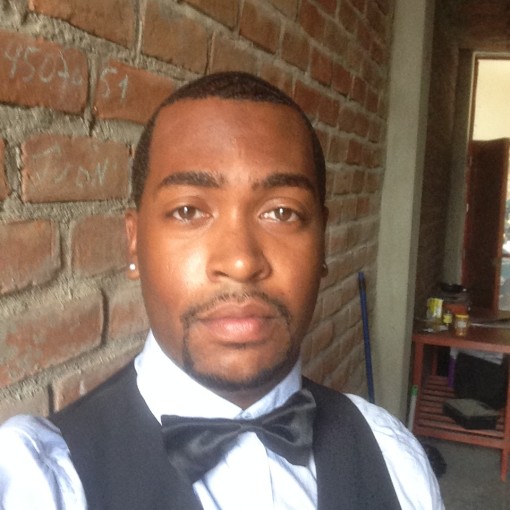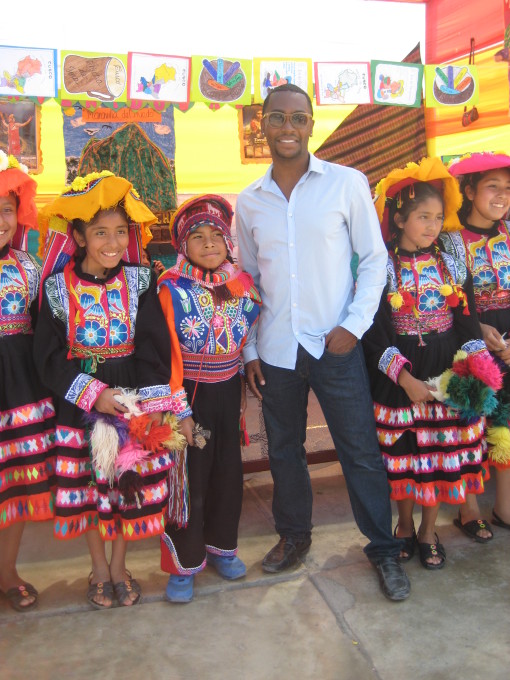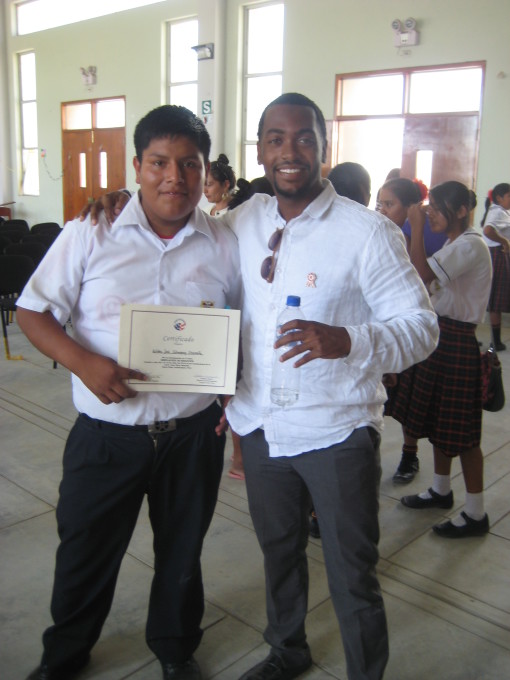Almost a month ago to today’s date I read a very disheartening yet candid account about “the struggles of being a black male in the Peace Corps”. It made me really sad because as a young black female I’ve dealt with similar colorism/classism issues here in Botswana (and other places around the world).
Taking this connection as a sign to feature his story on this site, I reached out to Craig for an interview.
We both whole heartedly are striving to ensure that volunteers of color are fully prepared for what they may encounter in their host countries. Stay tuned for a big collaboration project we are launching next month!
As always if you have a question for Craig, please leave a comment down below or reach out via his multiple social media platforms.
1. Please introduce yourself.
First of all my name is Craig Chavis Jr., and currently I am serving as a Peace Corps Volunteer in Peru. My specialty is community economic development and my role is to essentially improve the lives of Peruvian citizens through the vehicles of small business consulting, youth entrepreneurship, and financial education. Serving in the Peace Corps can be said to be my first “real job”. I joined right after I obtained my MBA and before that I worked for myself as a DJ and also co-owned a t-shirt and silicone wristband producing enterprise out of my college dorm room.
I am an avid traveler and have previous experience living abroad in Spain and Costa Rica. I speak Spanish fluently as a second language and Portuguese is in the works as a third.
2. What sparked your interest in exploring the world?
During my sophomore year of playing college playing football I tore my hamstring during practice. This quickly ended my football career and frustrated me to the maximum. All I had known or cared about was sports and I did not have much going for me outside of football (at least I thought). I hated the school I attended, did not have much of a social life on campus outside of the football team, and my grades were slipping due to poor interest in the course material I was supposedly learning. Dropping out of school and or transferring to another institution weighed heavily on my mind. I was studying business at the time and ironically enough the only solid grades I received were from my Spanish class.
My Spanish professor was the only person who seemed to give a damn about me (other than my parents) and she suggested that I apply for a scholarship to study abroad in Costa Rica. I figured it would be a waste of time and I only applied out of sheer pity for the simple fact that my professor would remind me to submit my application after every class. Fast-forward a few weeks and I was notified that I received a full ride to study abroad in San Jose, Costa Rica for two months. As a somewhat depressed 19 year old I felt I had nothing lose, so I packed my bags, hopped on a plane, and plunged into the unknown. I had absolutely zero knowledge at the time that this decision would impact my life so profoundly.
Studying abroad in Costa Rica absolutely shattered my old belief systems, allowed me to experience life outside of my comfort zone, and forced me to look at the world via a whole new perspective. The intimate experience of living with an elderly host family drove me to quickly learn a new language in order to communicate. I made new friends with people from other countries only to realize that we all had the same wants, needs, and aspirations in life. As I think back it seems impossible to sum into words how much my study abroad experience in Costa Rica changed my life and sparked my wanderlust for travel.
3. As a young black male, what advice would you give to others inspired by your travels and interested in the Peace Corps but afraid to take the first step?
First of all, as a young black male you must be aware of the global climate you are living in – racism exists everywhere. You cannot escape it, wish it away, or negate its all reaching presence. With this caveat in mind, as a young black male you will also be perceived and judged differently than others. The worldwide media has casted various images, stereotypes, and misconceptions of who black men are and it is up to us to break the mold to create our own reality. Fear is nothing more than amputated thinking in the presence of the apparent unsolvable. AKA, it is all in your mind and in order to see or experience the unknown you simply have to take the plunge.
Joining the Peace Corps is a great way to not only see the world but you may also gain a set of invaluable skills, make first-hand connections on the ground, and open your mind to a new paradigm of thought. The application process is now simpler, more streamlined, and with less uncertainty. You now have the ability to request a specific program area of service, select the country where you would like to serve, and choose an estimated date of departure. There is nothing to lose and with the Peace Corps new “Diversity Initiatives”, the recruitment of “minorities’ such as young black males should help your application stand out. The only thing holding you back young black man, is you!
4. How long was your Pre-Service Training and would you do it again?
Pre-Service Training (PST) lasted for 11 weeks in total. Although some days seemed quite mundane and repetitive, I would wholeheartedly do PST all over again. There is just something special about being surrounded by all of your peers in a new, exciting, and unknown environment. Simply put, once you leave PST nothing is ever the same. Other people change, you change, and some relationships start to fade. My advice is to enjoy your time with other volunteers because you never know when your paths may cross again after PST.
5. How is life in Peru for you? What are your likes and dislikes?
I swear I could write an entire novel based on my current life in Peru. No day is exactly the same and I never know what experience is awaiting for me around the corner. Currently, I live by myself without a host family, set my own schedule, and work independently. Within this flexible dynamic I do have a set routine I use to keep myself productive. For the most part on a daily basis I:
- Work in-person with my counterparts
- Cook all of my meals
- Exercise
- Read a book or listen to a podcast
- Meditate
To be honest I have a complete love-hate relationship with Peru. Just like with any country in the world, there are various pros and cons to the current culture and lifestyle. As a Peace Corps Volunteer I have the unique opportunity to experience both sides of the spectrum. One moment I could be working in a remote third world village and the next day I could be sleeping in a 5 star hotel in downtown Lima. To answer the question more in detail, here are some of my likes and dislikes related to my experiences in Peru:
Likes
- Food – Peruvian gastronomy is simply incredible. The seafood here is world class and you can fill yourself up for under $5 a meal almost anywhere in the country.
- Nature – Peru is a nature lover’s paradise with one of the world’s most varying range of climate zones. You can see glaciers, jungles, beaches, deserts, and forests all within a few hours of travel (via airplane).
- Cost of Living – You can live in most parts of Peru on less than $20 a day very comfortably if you know how to budget your money.
- People – Peruvians in general are very warm and hospitable. The culture is full of festive celebrations and traditions, many of which are world renown.
- Varying Cultures – Peru is separated into coastal, mountain, and jungle regions. Each region has its own unique culture including various sub-cultures. It is fun to experience the difference in customs from place to place.
Dislikes
- Racism/Colorism – The darker your skin the more discrimination and alienation you tend to receive. Moreover, the media has an infatuation with the European standards of beauty and culture which affects how Peruvians view themselves and others. As a dark skinned black man I have been mistreated, arrested, and detained by police simply based upon my appearance.
- Defeatus Mentality – Due to colonialism, corruption, and discrimination some Peruvians do not think they have the right or the power to change their lives. Those who maintain this backward way of thinking are accustomed to waiting on a handout or miracle to come their way instead of working to improve their situation.
- Corruption – This element prevails in many if not all of the world’s governmental systems. Unfortunately here in Peru, it is more overt than covert.
- Infrastructure – The roads, public facilities, and utilities outside of major cities are in abysmal form. It can take up to 10 times the amount of time to drive somewhere versus flying there.
- Pollution – In the coastal regions more so than not, garbage is burned in the streets, people obsessively litter in public, and minimal effort is used to discard of trash in an ecological matter. Peru is a beautiful country but the pollution is a buzzkill.
6. Where can people get in touch with you if they have any questions?
People can get in touch with me in several ways:
- Subscribe to my Blog: https://www.thegopreneur.com
- Like me on Facebook: https://www.facebook.com/thegopreneur
- Follow me on Twitter: https://www.twitter.com/thegopreneur
- Subscribe to my YouTube: https://www.youtube.com/thegopreneur
- Send me an Email: craig@thegopreneur.com
Thank you for featuring me on this wonderful blog and I look forward to answering any comments and or questions from your readers. I hope to continue this working relationship with TravelingNatural.
Sincerely,
Craig M. Chavis Jr.,
AKA “The Gopreneur


